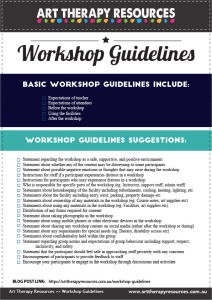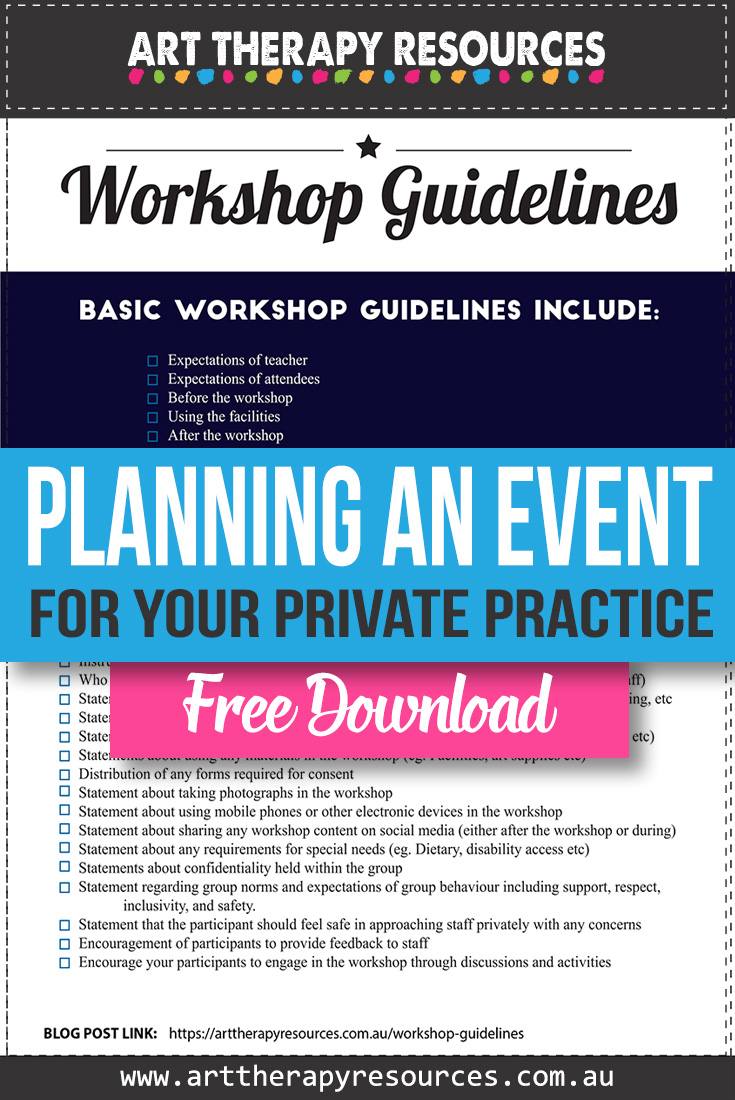THIS POST INCLUDES:
1. Types of events for a therapist
2. Stages of running an event
3. Planning an event
4. Choosing your event topic
5. Free Download Art Therapy Workshop Guidelines Checklist
TYPES OF EVENTS FOR A THERAPIST
There are many different types of events that a therapist could run in their private practice, depending on their specific areas of expertise and the needs and interests of their clients. Here are a few possibilities:
- Workshops: Therapists could host workshops or seminars on various topics related to mental health and wellbeing, such as mindfulness, stress management, communication skills, or self-care. These events could be designed for small groups or larger audiences and could be offered in-person or online.
- Support groups: Therapists could facilitate support groups for individuals who are dealing with specific challenges or issues, such as grief and loss, addiction recovery, or chronic illness. These groups could provide a safe and supportive environment for individuals to connect with others who are going through similar experiences.
- Social events: Therapists could organize social events for their clients, such as game nights, movie screenings, or potluck dinners. These events could help clients build social connections and foster a sense of community.
- Educational events: Therapists could offer educational events, such as talks or webinars, on topics related to mental health and wellbeing. These events could be designed for professionals in the field, as well as for clients and the general public.
- Retreats: Therapists could organize retreats for clients, providing opportunities for rest, relaxation, and personal growth. These retreats could be designed to focus on specific themes or issues, such as mindfulness, self-compassion, or creativity.
Ultimately, the types of events a therapist could run in their private practice will depend on their own interests, expertise, and the needs of their clients.
STAGES OF RUNNING AN EVENT
Running an event can involve several stages, and the exact process may vary depending on the type and size of the event. However, here are some general stages that are typically involved:
- Planning: This stage involves defining the purpose and objectives of the event, identifying the target audience, selecting the date, time, and venue, and determining the budget and resources needed to make the event happen.
- Preparation: In this stage, the event planner will develop a detailed plan that outlines the event schedule, program, and logistics. This may include creating a guest list, sending out invitations, arranging for vendors, equipment, and supplies, and coordinating with staff and volunteers.
- Execution: This is the stage when the event actually takes place. The event planner will oversee the set-up and management of the event, ensuring that everything runs smoothly and according to plan. This may involve managing registrations, providing directions and assistance to guests, handling unexpected issues, and ensuring that the event stays on schedule.
- Evaluation: After the event is over, the planner will conduct an evaluation to determine how successful the event was in achieving its objectives. This may involve soliciting feedback from guests, staff, and vendors, analyzing financial and attendance data, and identifying areas for improvement for future events.
- Follow-up: In this final stage, the event planner will follow up with guests, vendors, and other stakeholders to express gratitude, provide feedback, and gather information for future events. This may include sending thank-you notes, providing follow-up surveys, or organizing post-event meetings to discuss outcomes and next steps.
These stages are not necessarily sequential and may involve overlapping tasks. Successful event planning involves careful attention to each stage to ensure that the event meets its goals and provides a positive experience for all involved.
PLANNING AN EVENT
Planning for a workshop as a therapist involves several key steps to ensure that the event is organized, engaging, and effective in meeting the needs of the target audience. Here are some general steps a therapist may take when planning for a workshop:
- Define the purpose and goals: The first step in planning a workshop is to define the purpose and goals of the event. The therapist should consider the needs of their target audience and the specific topics or skills they hope to cover in the workshop. Defining clear and measurable goals will help guide the planning process and ensure that the workshop meets the needs of participants.
- Determine the logistics: Once the purpose and goals have been defined, the therapist should determine the logistics of the workshop, including the date, time, and location of the event. They should also consider the length of the workshop, the number of participants they can accommodate, and any necessary materials or equipment.
- Develop the content and agenda: Based on the purpose and goals of the workshop, the therapist should develop the content and agenda for the event. This may involve creating a presentation or handouts, designing interactive activities, and planning for group discussions or role-play exercises. The therapist should also consider how they will engage participants and ensure that the content is relevant and practical.
- Market the workshop: To attract participants to the workshop, the therapist should market the event through various channels, such as social media, email newsletters, or word-of-mouth. They should also consider the best ways to reach their target audience and ensure that the marketing materials clearly communicate the benefits of attending the workshop.
- Prepare for the event: In the days leading up to the workshop, the therapist should prepare any necessary materials or equipment, rehearse their presentation or activities, and ensure that the workshop space is set up and ready to go.
- Evaluate the workshop: After the event is over, the therapist should evaluate the workshop to determine its effectiveness in meeting its goals. This may involve soliciting feedback from participants, analyzing attendance data, and identifying areas for improvement for future workshops.
By following these steps, a therapist can plan and execute a successful workshop that provides valuable learning experiences for participants and helps them achieve their goals
CHOOSING YOUR EVENT TOPIC
Choosing a topic for a therapy event can be a challenging process, but there are several steps you can take to help you find a topic that is engaging, relevant, and meaningful for your clients. Here are some general steps you can take:
- Consider your area of expertise: Start by considering your area of expertise and the types of issues that you have experience in treating. You may want to focus on a topic that is aligned with your specialty or that you feel particularly passionate about.
- Identify the needs of your clients: Think about the needs of your clients and the types of issues they are struggling with. Consider the most common themes or concerns that you hear from your clients in your practice, and use this information to guide your selection of a topic.
- Research current trends and best practices: Stay up-to-date on the latest research and best practices in your field. Read articles and attend conferences to learn about emerging research and techniques that may be relevant to your clients.
- Consider the context of the event: Think about the context in which the event will be held, such as the location, audience size, and length of the event. This may help you narrow down your topic and focus on areas that are most relevant to the specific event.
- Solicit feedback: Ask your colleagues for feedback on potential topics. This can help you gain insight into what potential clients are most interested in and what they would like to learn more about.
- Be creative: Finally, don’t be afraid to be creative and think outside the box when choosing a topic for your event. Consider new and innovative approaches to therapy, or topics that are not typically covered in traditional therapy settings.
By following these steps and taking the time to carefully consider your topic, you can select a topic that is engaging, relevant, and meaningful for your clients and helps them achieve their therapeutic goals.
FURTHER READING:
Below are some previous blog posts that will help you plan your event or workshop for your private practice:
ART THERAPY
- How To Organise an Art Therapy Group
- How to Write Educational Content for Your Therapy Practice
- Preparing Guidelines for an Art Therapy Workshop
PLANNING
PRODUCTIVITY
PROFITABILITY
FREE DOWNLOAD: Art Therapy Exercise
SIGN UP below to download the FREE Art Therapy Workshop Guidelines Checklist to help plan your next workshop.

BUILD YOUR ART THERAPY REFERENCE MATERIALS:
Pin this image to your Pinterest board.

SHARE KNOWLEDGE & PASS IT ON:
If you’ve enjoyed this post, please share it on Facebook, Twitter, Pinterest. Thank you!
